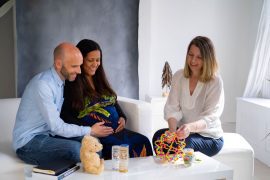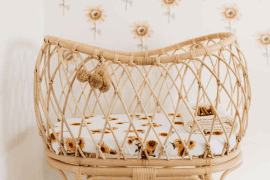It requires emotional and developmental readiness for your baby to be able to fall asleep without breastfeeding. Your baby will take this step in his own time and there’s no reason to rush this for fear of creating a bad habit. A very important part of each breastfeed in the early weeks and months is time to suckle for comfort. This is when the milk flow has slowed and your baby has had enough to drink but he is still sucking to soothe and settle himself into a peaceful sleep. As your baby gets older he may become too distracted to feed during the day and so feeding to sleep can become the only time that he feeds well. Your baby will continue to feed to sleep for as long as he continues to have the need. It’s not a habit, it’s him following his biological needs.
Your baby needs to be held.
It’s normal. It’s necessary.
Touch is one of our most basic needs in life and crucial for optimal brain and physical development. Skin-to-skin contact between you and your baby stabilises each of your heart and breathing rates, reduces the stress hormones in your body, and helps you to sleep better, just to name a few – research confirms this.
Your baby communicates with his body language and with crying. You instinctively respond to your baby’s cry by picking him up, holding him close, offering him a feed, rocking him.
Holding your baby. Breathing in his “baby” perfume. Watching him sleep peacefully in your arms. Feeling his warmth and softness against your own skin. Observing his every twitch and facial expression. These are some of the most beautiful moments as a new parent. These are the moments that make you want to make time stand still. We are hardwired to love, protect and nurture our babies. Holding your baby close and for hours at a time is what you instinctively want to do. The more your baby is held the more settled he will be, the more secure he will feel, the better he will feed and sleep and the more relaxed you will feel.
So when did our society decide that these moments should no longer be a parent’s joy? That these behaviours of meeting our baby’s (and, let’s face it, our own) physical and emotional needs was “spoiling” them or would create a “bad habit” and should be discouraged?!
No, holding your baby does not create spoiling, bad habits of never wanting to be put down, or sleeping problems. In fact, research strongly points out that not holding your baby enough is detrimental to physical and emotional development. When a baby’s cry is not responded to (such as in “controlled” crying) they release dangerously high levels of the stress hormone cortisol which has shown to significantly increase anxiety levels later in life.
Your baby has spent 9 months wrapped safely and securely in your womb, with every need met at every hour of the day. Human babies are born the most helpless in the animal kingdom – it’s just unreasonable to expect your baby to settle and sleep independently within a few short weeks. It’s these unreasonable expectations that leads parents to cry out for help when your baby won’t sleep unless he’s being held or he only sleeps for a few short minutes before waking up and crying only to fall asleep again in your arms. He needs you. He wants to feel comforted by you. He doesn’t need to know how to sleep on his own just yet. It’s OK to hold him. A baby carrier is ideal for spending long periods of time in close contact with your baby. It’s not actually possible to “spoil” a baby with cuddles. It’s one of your baby’s fundamental needs.
So let’s embrace and accept the normal breastfeeding and sleeping behaviours of babies. How much better would we feel about our own parenting? How different would our expectations be?
Nature has this perfected for survival. Let’s stop trying to fix what’s not broken and instead support one another to navigate the realities and hardship that is parenting, especially in the middle of the night. So put your baby in that baby carrier, snuggle in close and hold on for the ride.
Rowena Gray is a mother to 3 young daughters, nurse, midwife and International Board Certified Lactation Consultant (IBCLC) and has been both a consumer and giver of copious amounts of breastfeeding advice! She has a private practice in Melbourne, Aus. www.rowenagray.com.au
Rowena is also the author of ‘Born to Breastfeed – the first six weeks and beyond’ available in bookstores and online.











Another brilliant, well ‘spoken’ article by Rowena – it really does feel like you’re sitting next to a new born mother and reminding her that she IS her baby’s safe space.
Well done – I will be sharing this with ALL of my new born mums and waiting with anticipation for your next article – keep them coming. – Bethany Meakin – Doula
Wonderful, thanks for the positive feedback!